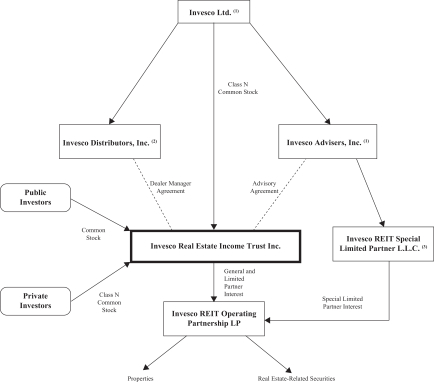On September 28, 2020, four of our directors purchased an aggregate of 15,237 shares of our Class N common stock, at a purchase price per share of $25.00, for an aggregate purchase price of $380,900. On December 21, 2020, five of our directors purchased an aggregate of 17,428 additional shares of our Class N common stock, at a purchase price per share of $25.16, for an aggregate purchase price of $438,585. On January 22, 2021, five of our directors purchased an aggregate of 16,939 additional shares of our Class N common stock, at a purchase price per share of $26.96, for an aggregate purchase price of $456,857. On February 3, 2021, five of our directors purchased an aggregate of 5,382 additional shares of our Class N common stock, at a purchase price per share of $26.93, for an aggregate purchase price of $144,964.
On March 1, 2021, eleven employees of the Adviser or its affiliates purchased an aggregate of 95,211 Class N shares, at a purchase price per share of $26.99, for an aggregate purchase price of $2.6 million.
In accordance with our equity incentive plan, on November 30, 2020 we granted each of Messrs. Nixon, Rowsey and Kelly 1,239 shares of Class N common stock and Mr. Forson 1,405 shares of Class N common stock. In accordance with our equity incentive plan, on February 1, 2021, we granted each of Messrs. Nixon, Rowsey and Kelly 174 shares of Class N common stock and Mr. Forson 197 shares of Class N common stock. In accordance with our equity incentive plan, on May 1, 2021, we granted each of Messrs. Nixon, Rowsey and Kelly 170 shares of Class N common stock and Mr. Forson 193 shares of Class N common stock.
On November 20, 2020, we sold 125 shares of our 12.5% Series A Redeemable Cumulative Preferred Stock at a purchase price of $500 per share for an aggregate purchase price of $62,500.
We intend to use the net proceeds from the foregoing sales for the purposes set forth in the prospectus and in a manner within the investment guidelines approved by our board of directors.
Each of the transactions described above was exempt from the registration provisions of the Securities Act of 1933, as amended, by virtue of Section 4(a)(2) thereof because they were not part of any public offering and did not involve any general solicitation or general advertising.
Item 34. Indemnification of Directors, Officers and Others.
Our organizational documents generally limit the personal liability of our stockholders, directors and officers for monetary damages and require us to indemnify and advance expenses to our directors, officers and the Adviser and its affiliates subject to the limitations of the NASAA REIT Guidelines and Maryland law. Maryland law permits a corporation to include in its charter a provision limiting the liability of directors and officers to the corporation and its stockholders for money damages, except for liability resulting from actual receipt of an improper benefit or profit in money, property or services or active and deliberate dishonesty established by a final judgment and which is material to the cause of action. The Maryland General Corporation Law (the “MGCL”) requires a corporation (unless its charter provides otherwise, which our charter does not) to indemnify a director or officer who has been successful, on the merits or otherwise, in the defense of any proceeding to which he or she is made or threatened to be made a party by reason of his or her service in that capacity. The MGCL allows directors and officers to be indemnified against judgments, penalties, fines, settlements and reasonable expenses actually incurred in connection with a proceeding unless the following can be established:
| | • | | an act or omission of the director or officer was material to the cause of action adjudicated in the proceeding, and was committed in bad faith or was the result of active and deliberate dishonesty; |
| | • | | the director or officer actually received an improper personal benefit in money, property or services; or |
| | • | | with respect to any criminal proceeding, the director or officer had reasonable cause to believe his or her act or omission was unlawful. |
A court may order indemnification if it determines that the director or officer is fairly and reasonably entitled to indemnification, even though the director or officer did not meet the prescribed standard of conduct or was adjudged liable on the basis that personal benefit was improperly received. However, indemnification for an
II-2






